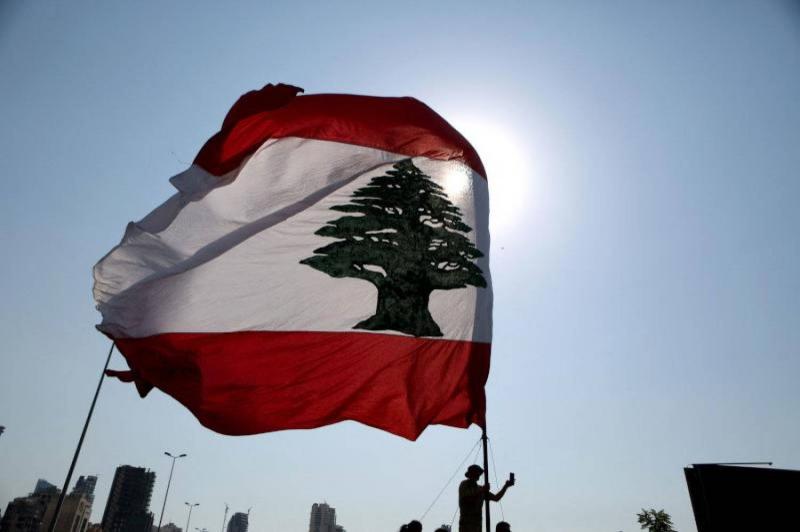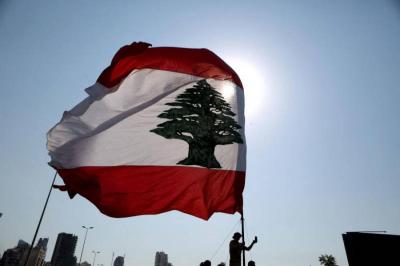The head of the media and communication department in the Lebanese Forces, Charles Jabbour, was not successful in his conclusions in an article published on Monday, February 26, in the newspaper "Al-Joumhuria," titled: "The Solution is Two States in Lebanon as Well." He stated at the end of his lengthy article: "It is the right of the Lebanese, Syrian, Iraqi, and Yemeni peoples to live in stability and prosperity. The experience in Lebanon, Iraq, and Yemen indicates that it is very difficult for Iran to retreat from a strategy that is part of its very existence and vision for its role and its conflicts. Therefore, the only solution remains in quickly moving towards a two-state solution starting from Lebanon, either through diplomacy or de facto."
This conclusion was preceded by a detailed presentation of the policy pursued by the Iranian mullah regime in the region, based on confirmed and acknowledged information and positions. As presented and explained, it relies on the use of militias and irregular military forces in countries linked and subordinate to Iran, in order to engage the United States and Western countries, aimed at defending Iranian interests and pressuring Western countries, even at the expense of Arab countries' interests and stability. This article, with its implications, clearly reveals that the Lebanese Forces are preparing to announce a position that is still taking shape regarding the configuration of the system in Lebanon. The head of the Lebanese Forces, Dr. Samir Geagea, has previously declared that if Hezbollah manages to bring its candidate to the presidency this time, there will be another position from us, and the structure of the current Lebanese state must be reconsidered. He has openly stated, "The state is not functioning this way" and "This situation cannot continue."
It can’t be concealed that a large segment of youth voices, some intellectuals, political activists, and media outlets supported and funded by Western entities, along with some academics advocating and promoting the idea of federalism and cantons in Lebanon, revolve closely around the Lebanese Forces in one way or another. Furthermore, the sentiments among a significant majority in the Christian environment have begun to express their discontent with the current political format and structure dominating Lebanon. This is especially true in light of the accumulated failures since Iran's rise and control, led notably by Hezbollah in Lebanon, and in some regional countries that Iran has previously boasted of controlling as part of the Persian state aggregate, a rising pole aspiring to expand and dominate the region as a whole.
In summary, there is an apparent "squeezed feeling," even suffocation, from Hezbollah’s and the "national duo" (Hezbollah and Amal Movement) increasing control over the Lebanese state and decisions in Lebanon, politically and security-wise.. and potentially economically in the future. Hezbollah's involvement in the engagement war in the south, alongside the flood of Al-Aqsa war in Gaza, is merely the latest imposed conflicts on most Lebanese, without consulting them or considering their desires and interests.
It’s true that solidarity with the Palestinian people in their current catastrophe in Lebanon is widespread. However, it's also true that Lebanon can no longer bear a war orchestrated by Iran and executed in Lebanon without its participation. The general Lebanese annoyance, particularly among Christians, has reached advanced stages due to the monopoly of Iran and Hezbollah over Lebanese decisions. This is fostering movements and aspirations for separation and thoughts of liberation and hasty escapes from this increasing, strong, and suffocating control in every direction.
It is no coincidence that recently, there has been discontent with the growing Iranian influence and Hezbollah's monopoly over the opportunistic duo, the ever-affluent General Michel Aoun and his restless son-in-law, Gebran Bassil, who is known for his bargaining and extortion.
For objective fairness, the Taif Agreement and the current form of governance could not have been adopted and come to fruition without the support of three principal Maronite figures at the time from the late 1990s: the late Maronite Patriarch Nasrallah Boutros Sfeir, the late head of the Lebanese Phalanges Party Dr. George Saadeh, and the then-leader of the Lebanese Forces, Dr. Samir Geagea, from his confinement in Ghadrass. If Patriarch Sfeir were alive today, he would not remain silent or hesitate to raise the sword of objection, opposition, and perhaps revolution against the confiscation and control over decisions in Lebanon.
It cannot be defended or accepted, in any form, the increasing monopoly led by Hezbollah and the March 8 Coalition over Lebanese decision-making over the last two decades. Currently, the public Lebanese complaint, especially among Christians, is justified and even exacerbated in these times. Hezbollah indeed led and managed to liberate the south from Israeli occupation in 2000, a task that UN resolution 425 failed to achieve. However, the party that has expanded its influence since 2005, succeeding the Syrian control, has transitioned from making significant sacrifices in the south to extending its influence over other aspects of Lebanese governance.
Ironically, the Lebanese Forces, which contributed significantly and fundamentally to revitalizing and shaping the Lebanese national decision by supporting the approval of the Taif Agreement with Patriarch Sfeir and the Phalanges Party and safeguarding the Lebanese national decision in the late 1990s, and later on maintaining the sensitive and important mountain reconciliation... now seeks in a hurried, frantic, unstudied, and tense manner for solutions that may be clumsy and insane to escape from the current crises in Lebanon.
It is certain that the political and authoritarian regime in Lebanon, as it stands now, is neither settled, complete, nor ideal, encompassing many errors and pitfalls in execution, along with vulnerabilities and weaknesses subject to reform and restoration.
It is also certain that it is not sustainable or reasonable to hastily terminate a marriage contract that was formulated at Taif, between Muslims and Christians, under solid and comprehensive Arab and international sponsorship, merely because several jealous, isolated, and arrogant parties attempted to undermine this contract and seize its resources after breaching points and clauses by implementing it in a clumsy manner.
If the Lebanese Forces, as indicated by their spokesperson Charles Jabbour in his article, are betting on Saudi Arabia to convince Iran to mitigate the negatives and dangers of its projects in the region, who said that Saudi Arabia will agree to propositions leading in Lebanon, directed by the Lebanese Forces, towards a two-state solution as the article's author mentioned?
Past experiences, and surely current ones with indicators of the future, show that moving away from the single national state formula established at Taif in Lebanon, despite all the crises, negatives, gaps, and setbacks, will only lead to one certain and guaranteed path, given the presence of this large number of displaced persons, residents, and refugees: the path of national disintegration and oblivion, beyond which there will be no resurrection.




